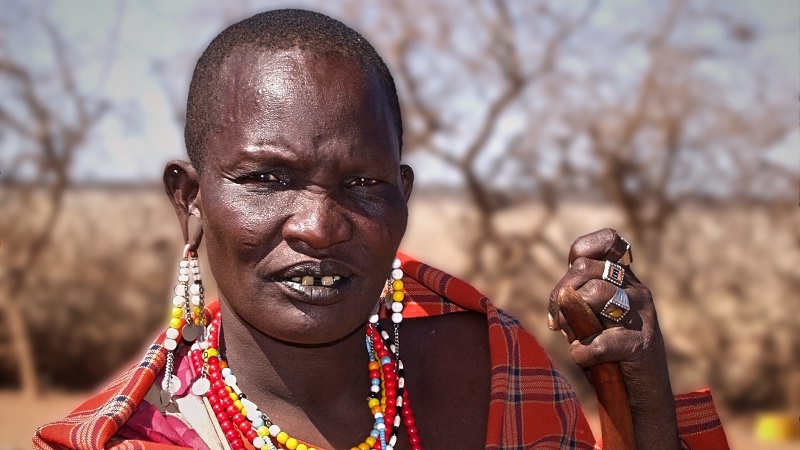“Caution—Cows Crossing!” The yellow sign jolted me out of a half-sleep. For hours, the vehicle I rode in bounced crazily over the plains of Tanzania. Along the way, I saw antelopes, zebras, and ostriches. Suddenly, seemingly in the middle of nowhere, the triangle-shaped warning sign stood at the side of the road. It welcomed me to Maasai country.
From then on, I saw the Maasai along the sides of the very rough dirt track on which we traveled. The tall herders with long spears and colorful robes drove their animals before them. Some eyed us suspiciously, others waved a greeting. Soon the setting sun flooded the Savannah in warm red light until it slowly gave way to a cinematic full moon.
It was late when I reached Emboreet. The little village lay in complete darkness. A light burned at the mission station, however, because of the solar panels installed on the roof. Father Peter Pinto SVD, a Divine Word Missionary priest from India, waited for me. “I know you just got here,” he said, “but we need to leave right away for a neighboring village where I have been called to anoint someone who is sick.”
And so my first encounter with the Maasai took place in pitch-black darkness. When we finally got out of the car at the cluster of huts, we were surrounded by people who wanted to greet us. Children pressed our palms to their foreheads, hoping for a pat on the head. The earrings of the Maasai jingled and tinkled in the dark as they moved. Cows grunted and bellowed softly behind the thorny walls of their brush corrals in the center of the boma or village.
People brought plastic chairs for us from their huts, washed our hands with hot water, and then served us sweet tea with milk, along with dishes of goat meat and liver. While Father Peter went into one of the huts to anoint the sick person, the Maasai gathered around me and asked how old I was. “Thirty-two,”I answered. “Excellent,” replied one of the men. Apparently, I was just the right age to marry one of his daughters! I explained that I was already married, but he shrugged his shoulders as if to say: “No problem!” His offer still stood. He was willing to give me his oldest daughter, as well as one of his younger daughters, who was not doing well in school. This meant that he would probably have trouble finding a husband for her. It was a really good deal. Imagine—two wives for the price of one. Unfortunately, I did not have ten head of cattle to give him in exchange. That was the price that they expected of a rich mzungu (white man) for such a bargain.
The night at the mission station was short. Early Sunday morning we walked to the church at Emboreet. Above the door was an image of the Good Shepherd, an image that builds a bridge with the Maasai. “The Maasai believe that God left them all cattle of the earth,” said Fr. Peter. “Cattle shape every aspect of their culture. They build their huts from cow manure, and they drink fresh cow blood as an important part of their ceremonies. Any Maasai who owns fewer than fifty head of cattle is commiserated by the others as a poor man.”
The magnificent songs and multicolored robes of the Maasai made the Mass a memorable event. During his homily, Fr. Peter chose his words carefully. On the one hand, he spoke out of a deep respect for the people. He has great regard for the distinctive ethnic identity of the Maasai. On the other hand, he did not hesitate to speak against traditions and customs that are contrary to Christian values. “Over and over again, I stress with the men that they must be respectful towards their wives and treat them as equals,” explained Fr. Peter. “I insist that the children must be allowed to go to school, and I argue strongly against the practices of female circumcision and the forced marriage of the young girls.”
Fr. Peter’s words have not been in vain. The Maasai understand that the missionary’s interest in their wellbeing is not simulated, but is honest, upright, and wholehearted. Fully half of those who attended Mass were patients from the clinic that Fr. Peter established close to the mission station. I accompanied him on his rounds through the forty-five-bed facility. People with simple complaints and minor wounds greeted us. A Maasai girl named Silau was very ill. While playing with her friends, she climbed into a tree and encountered a hive of wild bees. Swarms of bees stung her viciously. Now her face was puffy, red, and grossly swollen, and she could hardly see through the narrow slits of her enlarged eyelids.
A thick dust cloud followed us as we set out across the Savannah in Fr. Peter’s ambulance after lunch. We passed the landing strip laid out for the team of “flying doctors” who regularly stop at Divine Word Missionaries’ walk-in clinic. A group of Maasai women and children waited patiently for us in the shade of a large tree. Fr. Peter and his nurse assistants inoculated pregnant women, weighed newborns, and dressed smaller wounds.
I noticed one little boy whose arm ended in a prosthesis. The people who live in this area close to the Tarangire National Park are regularly attacked and mauled by wild animals. When that happens, Fr. Peter rushes to the scene and sets off with the patient on the trip to the hospital in Arusha. “Many don’t survive that long trip,” he told me. Thinking back to the pothole-riddled track that I bounced over the previous day, I understood.
Another picture-perfect sunset accompanied us as we returned to the mission station. Fr. Peter told me of his plans to expand the clinic by adding an operating room. Badly wounded people could be treated and deaths on the bumpy road to the hospital reduced. “Just last week,” he says, “I had a young, pregnant woman bleed to death on the way to the hospital in Arusha. We just weren’t able to do anything for her in our simple clinic here.”
Once again, the only light I saw was in the hut of the missionaries. I asked Fr. Peter whether there was enough juice in the batteries to charge my camera. “You can always try,” he said. I confidently plugged in my charger—and the mission station plunged into sudden darkness! We wished one another a good night, and I used the light from my cell phone screen to find the way to my bed.








